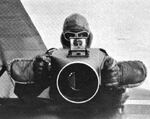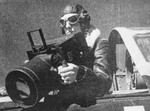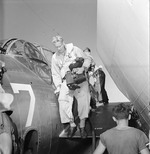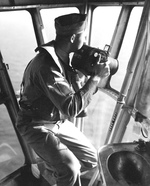Fairchild K-20 Camera
| Country of Origin | United States |
| Type | Camera |
| Weight | 8.155 kg |
Contributor: David Stubblebine
ww2dbaseSherman Fairchild was born in 1896 and worked throughout World War One to develop an aerial camera suitable for military use. Unfortunately, his first workable model was not completed until 1920. Fairchild's breakthrough was his development of a between-the-lens shutter that made for clear images with fast shutter speeds. He founded the Fairchild Aerial Camera Corporation dedicated to further develop his cameras. Several models were created but with World War II looming, the United States Government selected the Model K-20 for purchase.For production, the design was licensed to George Eastman's Folmer Graflex Corporation who made 15,000 for the United States armed forces. Lenses were produced (also under license) by Kodak, Ilex, and Bausch & Lomb. The cameras had a rugged, cast aluminum camera body with a fixed 161-millimeter lens. The 8.5 x 9.25 x 10.75-inch body was fitted with oversized side handles that would allow for a firm grip and easy operation while wearing heavy gloves. The camera included a diaphragm that applied a vacuum to hold the film flat during exposure. The K-20 created 4 x 5-inch exposures on 5.25-inch-wide film on a 20-to-200-foot roll, although a roll of 50 feet was most typical. The camera had to have its film loaded and unloaded in complete darkness, since there was no enclosed film cartridge.
Perhaps the most famous wartime photographs taken with the Fairchild K-20 were taken by Staff Sergeant George Robert "Bob" Caron, the tail gunner in the B-29 Superfortress "Enola Gay." On 6 Aug 1945, using a K-20, he took the only surviving photographs of the cloud rising from the atomic bomb over Hiroshima, Japan.
Fairchild designed several other aerial camera models during the war and the sheer number of airborne cameras in the combat areas is a large part of the reason there are so many striking images from World War II.
Sources:
Missouri University of Science and Technology
Flogging English Blog
Camera-Wiki/Fairchild
National Museum of Forest Service History
The USAAF 20th Combat Mapping Squadron
Alaska Aviation Museum
Wikipedia ww2dbase
Last Major Revision: Mar 2024
Fairchild K-20 Camera Mapa Interativo
Photographs
 |  |  |  |
Você gostou deste artigo ou achou este artigo útil? Se sim, considere nos apoiar no Patreon. Qualquer valor já vai ajudar! Obrigado. Por favor, ajude-nos a divulgar o site: Fique atualizado com WW2DB: |
Visitor Submitted Comments
24 Apr 2025 01:04:26 PM
I have a K20 Camera and I’m trying to verify the story that was included in the box. The timeline doesn’t add up. The serial number is USN43-4005 with the contract number N2885-11028. Is there any chance that this camera could have been produced before June 3,1942? Thank you, David
All visitor submitted comments are opinions of those making the submissions and do not reflect views of WW2DB.

- » USS Orlean's Bow Found (22 jul 2025)
- » The Emperor of Japan Planned to Honor WW2-era Japanese POWs in Mongolia (4 jul 2025)
- » US State Lawmaker John Winter Caught Using Racial Slur "Jap" and Apologized (11 jun 2025)
- » Race, Holocaust, and African-American WW2 Histories Removed from the US Naval Academy Library (7 abr 2025)
- » US Government Plans to Purge WW2 Information (17 mar 2025)
- » Ver todas as notícias
- » 1,180 biografias
- » 337 eventos
- » 45,098 entradas na linha do tempo
- » 1,246 navios
- » 350 modelos de aeronaves
- » 207 modelos de veículos
- » 376 modelos de armas
- » 123 documentos históricos
- » 261 instalações
- » 470 eventos
- » 28,467 fotos
- » 365 mapas
Thomas Dodd, late 1945
Por favor, considere nos apoiar no Patreon. Mesmo R$1 por mês já faz uma grande diferença. Obrigado!
Ou, por favor, nos apoie adquirindo alguns produtos do WW2DB na TeeSpring. Obrigado!
20 Aug 2024 12:35:14 PM
Fascinating segment on the balloon bombs of Japan. I was aware of the bombs but had no idea that the number launched was so large or of the technological difficulties surmounted to build these weapons.